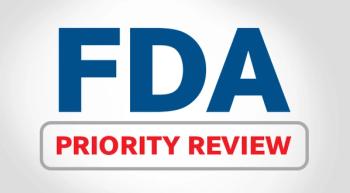Articles by Jason M Broderick

The FDA has granted a priority review to a new drug application (NDA) for apalutamide (ARN-509) for the treatment of patients with nonmetastatic castration-resistant prostate cancer (CRPC), according to Janssen Biotech, the manufacturer of the next-generation oral androgen receptor inhibitor.

Frontline Tagrisso (osimertinib) was granted a priority review to a supplemental new drug application (sNDA) by the Food and Drug Administration (FDA) to treat patients with non-small cell lung cancer (NSCLC) whose tumors have EGFR mutations (exon 19 deletions or exon 21 [L858R] substitution mutations).

Frontline Opdivo (nivolumab) plus Yervoy (ipilimumab) was granted a priority review to a supplemental biologics license application (sBLA) to be used to treat patients with intermediate- and poor-risk patients with advanced renal cell carcinoma (RCC).

Talazoparib, a PARP inhibitor is more effective than chemotherapy in reducing the risk of disease progression and death from BRCA-positive breast cancer.

A phase 3 clinical trial pitted a nine-week treatment of adjuvant Herceptin against the regimen of a full year of treatment for patients with HER2-positive breast cancer. Results show that the standard treatment of one year is still optimal.

The combination of Keytruda (pembrolizumab) and Herceptin (trastuzumab) showed promise for the treatment of women with Herceptin-resistant, PD-L1–positive, HER2-positive breast cancer.

A supplemental new drug application (sNDA) for Rubraca (rucaparib), a PARP inhibitor, has been granted a priority review by the Food and Drug Administration.

The FDA has granted Avastin (bevacizumab) a full approval for the treatment of adult patients with glioblastoma who progressed following prior therapy, according to Genentech, the manufacturer of the VEGF inhibitor.


A new drug was approved for patients with cutaneous T-cell lymphoma (CTCL).

Verzenio (abemaciclib) was granted a priority review to a new drug application (NDA) to be used in combination with an aromatase inhibitor for the frontline treatment of women with hormone receptor (HR)-positive, HER2-negative advanced or metastatic breast cancer, according to Eli Lilly and Company, the manufacturer of the drug.

The pharmaceutical company Clovis Oncology filed a supplemental new drug application (sNDA) to the FDA for their drug Rubraca (rucaparib) to be used as maintenance therapy for patients with recurrent epithelial ovarian, fallopian tube, or primary peritoneal cancer who are in a complete or partial response to platinum-based chemotherapy.

Alunbrig (brigatinib) was granted a supplemental new drug application for the treatment of patients with non-small cell lung cancer (NSCLC). Now, the drug can be administered via 180-mg tablets.

Verzenio (abemaciclib) was granted FDA approval for certain patients with advanced or metastatic breast cancer.

Keytruda (pembrolizumab) was granted FDA approval for the treatment of patients with recurrent or advanced gastric or gastroesophageal junction (GEJ) adenocarcinoma who have received two or more lines of chemotherapy and are PD-L1-positive.

Aliqopa (copanlisib) was granted FDA approval for the treatment of patients with relapsed follicular lymphoma who have received at least two least prior systemic therapies.

The Food and Drug Administration (FDA) recently released a statement providing data from the two phase 3 trials testing Keytruda (pembrolizumab) in patients with multiple myeloma. The trials were placed on clinical holds by the FDA in July, after concerns arose regarding the drug’s safety in this group of patients.

The Food and Drug Administration (FDA) approved Faslodex (fulvestrant) to treat patients with hormone receptor (HR)-positive, HER2-negative locally advanced or metastatic breast cancer in postmenopausal women who were not treated with endocrine therapy.

Imbruvica (ibrutinib) was granted approval by the FDA for the treatment of previously treated chronic graft versus host disease (cGVHD).

Opdivo (nivolumab) was granted approval by the Food and Drug Administration (FDA) for the treatment of both adult and pediatric patients with microsatellite instability-high (MSI-H) or mismatch repair deficient (dMMR) metastatic colorectal cancer (mCRC) who have progressed following treatment with a fluoropyrimidine, oxaliplatin and irinotecan.

Yervoy (ipilimumab) was granted approval by the Food and Drug Administration (FDA) for the treatment of pediatric patients who are 12 years old or younger and have unresectable or metastatic melanoma, according to Bristol-Myers Squibb (BMS), the manufacturer of the CTLA-4 inhibitor.

Nerlynx (neratinib) was granted approval by the Food and Drug Administration (FDA) for the extended adjuvant treatment of patients with early stage, HER2-positive breast cancer who have already received postoperative Herceptin (trastuzumab).

Abemaciclib was granted a priority review to a new drug application (NDA) to treat patients with advanced hormone receptor (HR)­­–positive, HER2-negative breast cancer, according to Eli Lilly and Company, the manufacturer of the CDK4/6 inhibitor.

Promising clinical activity and acceptable safety was shown when the PD-1 inhibitor Keytruda (pembrolizumab) was given with the HDAC inhibitor entinostat for patients with melanoma who were refractory to immune checkpoint inhibitors.

Rituxan Hycela (rituximab) was granted approval by the Food and Drug Administration (FDA) for adult patients with previously untreated and relapsed or refractory follicular lymphoma, previously untreated diffuse large B-cell lymphoma (DLBCL) and previously untreated and previously treated chronic lymphocytic leukemia (CLL).

The Food and Drug Administration (FDA) granted an approval to Darzalex (daratumumab) for use in combination with Pomalyst (pomalidomide) and dexamethasone for patients who have multiple myeloma who have two or more prior therapies, including a proteasome inhibitor and Revlimid (lenalidomide).

“This is the first phase 3 study to show an advantage of a PARP inhibitor over standard of care chemotherapy in breast cancer patients with a BRCA mutation,” said principal OLYMPIAD investigator Mark E. Robson, M.D., Clinic Director of the Clinical Genetics Service at Memorial Sloan Kettering Cancer Center.

Bavencio and Inlyta together produced a promising response for some patients with renal cell carcinoma.

When combined with the IDO1 inhibitor epacadostat, Keytruda (pembrolizumab), a PD-1 inhibitor, resulted in an overall response rate (ORR) of 35 percent in patients with advanced urothelial carcinoma, according to results from the phase 1/2 ECHO-202/KEYNOTE-037 trial.

Opdivo (nivolumab) plus Yervoy (ipilimumab) demonstrated a response in some patients with melanoma brain metastases, according to a recent study presented at ASCO.
















